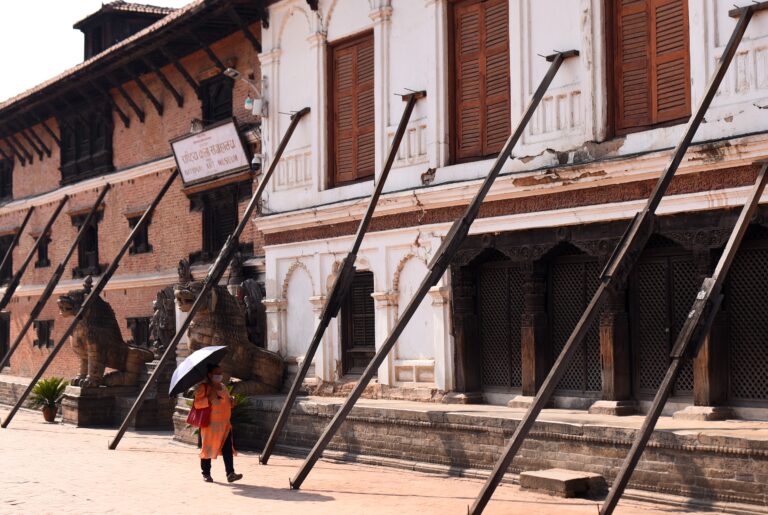
Even six years after the massive earthquake of 2015, some historic temples and monuments in the World Heritage Sites of the Kathmandu Valley are still standing in support of wooden and iron poles.
The tilted temples awaiting their renovation and reconstruction works standing in support of multiple wooden poles are eyesores to locals as well as tourists.
Shiva Parvati Temple and Aagam Chhe building in Hanumandhoka Durbar Square are still standing in support of multiple wooden poles, said Sandeep Khanal, Executive Director of Hanumandhoka Durbar Museum Development Committee.
However, National Reconstruction Authority (NRA) has facilitated the reconstruction of Aagam Chhe through the local community in February, 2019.
A building of Nepal Sanskrit University is still standing in support of multiple poles just in front of the Hanumandhoka Palace. The Department of Archaeology (DoA) has committed to allocating budget to reconstruct the building only in the coming fiscal year.
According to the record of the Planning Division of the DoA, reconstruction and repairing works on 493 of the 891 temples damaged in the 2015 earthquake have completed so far.
The devastating Gorkha earthquake in 2015 had damaged 891 temples, shrines, monasteries and rest houses across the country.
The earthquake had damaged 215 temples and shrines in Kathmandu, 73 in Bhaktapur and 130 in Lalitpur.
In Bhaktapur Durbar Square, the building of National Art Museum is standing only in support of poles as a dispute over its design has delayed its reconstruction, said Aruna Nakrami, chief of the museum.
However, the case of Patan Durbar Square is different from other durbar squares as no temples in Patan now stand in support of such poles.
The latest record of DoA shows that reconstruction of 110 temples has been completed in the UNESCO sites, 207 in the three ancient cities of the Kathmandu Valley and 176 in 14 districts outside the valley.
The heritages on the bank of the Bagmati River from Thapathali to Teku Dobhan are now being renovated and reconstructed under the Bagmati Beautification Project.
Currently, renovation tasks on these temples are moving ahead by dividing the area in three clusters . Around 27 heritages are being rebuilt and renovated here, and it is now the major reconstructing site in the Kathmandu Valley.
Planning Division of the DoA stated that heritages located from Thapathali to Teku confluence are being reconstructed by dividing them in three phases, and around 60 per cent reconstruction work of the first phase has completed.
The DoA said it would complete reconstruction works of the 150 heritages within the current fiscal year.
Twenty three multi-year projects have already been sent to the National Reconstruction Authority for procurement.
Reconstruction process has been severely impacted by the global coronavirus pandemic and the subsequent restrictions since March last year that further prolonged the project timeline.
Ram Bahadur Kunwar, spokesperson of DoA, said that decision of the government to halt material supplies has dealt a severe blow to the reconstruction project.
It has allocated Rs. 1.73 billion to reconstructremaining heritage sites for current fiscal year. Of the total budget, Rs. 200 million comes as foreign assistance from different countries. The DoA has so far spent Rs. 1.44 billion for the reconstruction of the monuments.
Source : THE RISING NEPAL,






